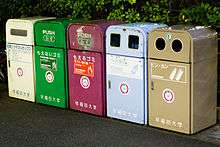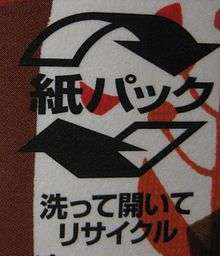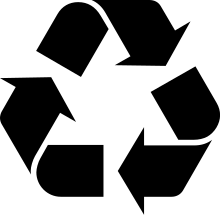Recycling in Japan
Recycling in Japan (リサイクル, Risaikuru), an aspect of waste management in Japan, is based on the Japanese Container and Packaging Recycling Law. Plastic, paper, PET bottles, aluminium and glass are collected and recycled. Japan’s country profile in Waste Atlas shows that in 2012 Recycling Rate was 20.8%.[1]

Container and Packaging Recycling Law
Also called Law for the Promotion of Sorted Collection and Recycling of Containers and Packaging, has been enforced since April 1997 by the Ministry of the Environment to reduce the waste of glass containers, PET bottles and paper cartons. Since April 2000 plastic containers and packages other than PET bottles have been included.[2] According to the law, the recycling is conducted by the Japanese Container and Package Recycling Association (JCPRA) (財団法人日本容器包装リサイクル協会, Zaidan-hōjin Nihon-yōki-hōsō-risaikuru-kyōkai), a government-designated organization established September 25, 1996.[3]
| Product | Volume of recycling tons | Change since 2000 | Recycling unit costs ¥ / kg | Change since 2000 |
|---|---|---|---|---|
| Glass bottles, no color | 155,076 | -16.04% | 4.1 | -1.23% |
| Glass bottles, brown | 133,560 | +43.62% | 5.5 | -28.40% |
| Glass bottles, other | 107,383 | +10.09% | 9.2 | +13.64% |
| PET bottles | 257,906 | +167.03% | 1.7 | -98.09% |
| Paper | 33,934 | -29.03% | 13.3 | -77.32% |
| Plastics | 853,581 | +463.53% | 65.7 | -37.43% |
- The consumers are required to follow sorting guidelines established by the municipalities.
- The sorted waste is then collected by the municipalities and stored for collecting by the recycling company.
- Manufactures and business entities using containers and packages have to pay a recycling fee to the JCPRA, in accordance with the volume they manufacture or sell.
- Each year recycling business entities are selected by a public bidding in every local municipality where a waste storage site is located. They are assigned to collect and transport the waste from the storage sites to recycling facilities. To make sure the waste is getting recycled, these recycling business entities receive payment only after showing a delivery report, signed by the recipient of the recycled products.
- If an item was disposed of improperly, a large red warning sticker is put on the offending rubbish bag to shame the person responsible.[5]
Recycling of steel cans is not regulated by the law, but in 2006 about 99% of the municipalities collected and recycled them.[6] In 1973 the Japan Steel Can Recycling Association (スチール缶リサイクル協会, Suchiiru-kan Risaikuru kyōkai), a non-profit organization to promote the recycling of steel cans, had been established. According to its statistics 88.1% of steel cans have been recycled in 2006, maintaining the world's highest level.[6]
Other recycling laws
- Home appliance recycling law (特定家庭用機器再商品化法, Tokutei Kateiyō Kiki Saishyōhinka Hō) - enacted June 1998, enforced April 2001
- Air conditioners, television sets, refrigerators and washing machines.
- Construction material recycling law (建設工事に係る資材の再資源化等に関する法律, Kensetsu Kōji ni kakaru Shizai no Saishigenka tō ni kansuru Hōritsu) - enacted May 2000
- Food recycling law (食品循環資源の再生利用等の促進に関する法律, Shokuhin Junkan Shigen no Saisei Riyō tō no Sokushin ni kansuru Hōritsu)
- End-of-life vehicle recycling law (使用済自動車の再資源化等に関する法律, Shiyōzumi Jidōsha no Saishigenka tō ni kansuru Hōritsu)
- Law for the promotion of effective utilization of resources - enacted May 2000, enforced April 2001
Symbols

 | Paper (紙, Kami) |
| Plastic (プラ, Pura) | |
| Aluminum (アルミ, Arumi) | |
| Steel (スチール, Suchiiru) | |
 | PET bottles |
Recycling plans
On March 25, 2008 the Japanese Cabinet approved a plan that targets to reduce the total waste from about 52 million tons in 2007 to about 50 million tons in 2012 and to raise the waste recycling rate from 20 to 25%. Thermal recycling and a charging system for waste disposal services will be promoted.[7]
3R Initiative
This G8 initiative, first proposed at the G8 Summit in June 2004, aims to Reduce, Reuse and Recycle waste.[8] At the G8 Environmental Minister Meeting in Kobe on May 24–26, 2008, the ministers agreed about the Kobe 3R Action plan. It intends to improve resource productivity, to establish an international sound material-cycle society and to bring forward 3Rs capacity in developing countries.[9][10] According to this plan, Japan also announced a New Action Plan towards a Global Zero Waste Society, aimed to establish material cycle societies internationally.[11]
The Japanese government set October as the official month for 3R promotions. This was done to specify and allocate deliberate time to encourage corporations and businesses to focus on the importance of reducing, reusing and recycling waste. During the promotion month, the government and other companies organise informative events and parties to publicise the ideas of a sound material-cycle society.[12]
Scandals
In January 2008 five paper companies in Japan were accused of misleading customers about the recycled paper content of their products. Oji Paper, the largest paper company in Japan, admitted that its copy and print paper contained 5 to 10% recycled paper, instead of the 50% stated. The president of Oji Paper apologized to its customers, and the president of Nippon Pages, the second largest paper company in Japan, resigned to take responsibility. The Japanese Fair Trade Commission said it would investigate.[13]
See also
- Recycling
- Waste management in Japan
- Electronic waste in Japan
- Mottainai - common Japanese expression, often used in this context
References
- Waste Atlas(2012). Country Data: JAPAN
- "Container and Packaging Recycling Law" (PDF). Ministry of the Environment, Japan. 2005-01-05. Retrieved 2008-11-16.
- "JCPRA Profile". JCPRA. Archived from the original on October 26, 2008. Retrieved 2008-11-16.
- "Recycling statistic". JCPRA. Archived from the original on 2011-06-13. Retrieved 2011-02-19.
- ""Recycling in Japan" or "Reasons to get it right and avoid eternal shame"". SoraNews24 -Japan News-. 2014-05-14. Retrieved 2020-03-23.
- "Japan Maintains World's Highest Steel Can Recycling Rate: 88.1% in 2006". japanfs.org. 2007-11-09. Retrieved 2008-11-17.
- "MOE Sets Targets to Reduce Waste, Increase Waste Power Generation and Recycling by 2012". japanfs.org. 2008-09-21. Retrieved 2008-11-16.
- "The 3R Initiative". Ministry of the Environment, Japan. 2008-05-27. Retrieved 2008-11-16.
- "G8 Environmental Minister Meeting". Ministry of the Environment, Japan. 2008-05-25. Retrieved 2008-11-16.
- "Kobe 3R Action Plan" (PDF). Ministry of the Environment, Japan. Retrieved 2008-11-16.
- "Japan's New Action Plan towards a Zero Waste Society" (PDF). Ministry of the Environment, Japan. Retrieved 2008-11-16.
- "History and Current State of Waste Management in Japan" (PDF). Ministry of the Environment. Retrieved 25 March 2020.
- McCurry, Justin (2008-01-18). "Recycling scandal hits Japan". London: guardian.co.uk. Retrieved 2008-11-16.
External links
| Wikimedia Commons has media related to Recycling in Japan. |
- The Japan Containers and Packaging Recycling Association
- 3R Initiative on the Ministry of Environment homepage
- Japan for Sustainability
- PC 3R Promotion Association
